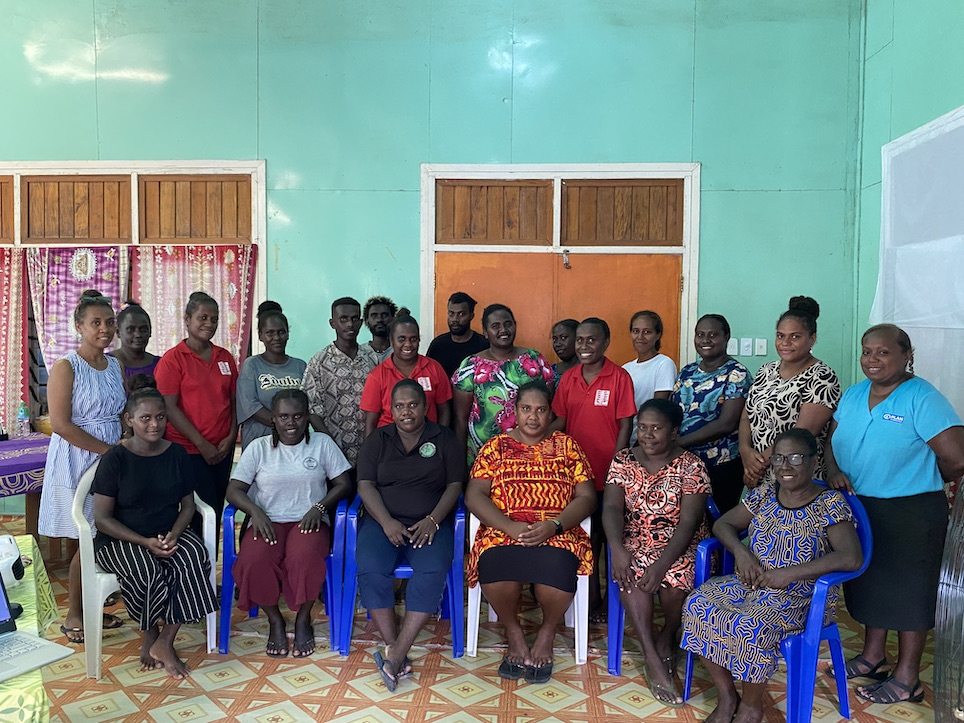
Thursday 29 February 2024, Honiara – A two-and-a-half day training skills workshop on knowledge brokerage was successfully conducted in Gizo, Western Province from 20 – 22 February 2024.
The training skills workshop benefited members of the Western Province Network for Sustainable Environment (WPNSE), and was coordinated in partnership between the Solomon Islands Government Ministry for Climate Change and Disaster Management (MECDM), the Australian Pacific Climate Alumni Network (APCAN), and the Pacific Climate Change Centre (PCCC), hosted at the Secretariat of the Pacific Regional Environment Programme (SPREP) in Apia, Samoa.
Prior to the start of the training, a courtesy call was made to the Premier of Western Province, Honourable Billy Veo and Provincial Secretary, Mr Patrick To’iraena.
Recently, there has been growing recognition of the critical role of individuals and organisations that fulfill a ‘bringing role’ between producers and users of information and knowledge. They are referred to as knowledge brokers. Within the climate change context in the Pacific Islands region, the overall vision of knowledge brokerage is that Pacific Governments and stakeholders receive timely and robust information in user-friendly formats for low emission and climate resilient development 2 . In doing so, it is envisioned that Governments, stakeholders and all decision-makers will be equipped with the most relevant and timely information to make climate sensitive decisions and boost resilience building.
During the workshop, participants were introduced to the theoretical concepts of knowledge brokerage, including processes and tools, such as systems thinking, causal loop
analysis, governance mapping and participatory monitoring, evaluation, and learning (MEL).
“The training helped me to understand what knowledge brokerage is and how I can apply it to my work,” commented Ms. Jully Joanita Kalamana, Environmental Officer, Environmental
Department of the Western Provincial Government; WPNSE Secretary; Vice Chairlady of Gizo Plastic Wise.
Ms Kalamana added that “as a knowledge broker, before going out to the community to advocate, we need to understand the information and message we want to share with the
communities. It must be in a format that our people can understand and value, and take ownership of even after we leave.”
“This training has added new knowledge so that I can better do my work with various stakeholders in my various capacities in the provincial Government, Plastic Wise Gizo and Western Province Network for Sustainable Environment,” said Ms Kalamana who is a champion for environmental work in Western Province.
The WPNSE is made up of heads of divisions of the Western Provincial Government (WPG), international and local environmental NGOs based in the Western Province, Community-
based organizations (CBOs) and Tourism operators. The WPNSE has a membership of approximately 20 organisations.
One of the functions of WPNSE is to act as a platform for information sharing and awareness, promote and support capacity building within the network, advocate for clean
environment and sustainable development, and contribute towards provincial ordinances/policies and byways.
“I’ve learned a lot from this training which adds value to my existing knowledge. One of my highlights is the use of causal loop analysis to identify key issues, interventions, and key
stakeholders to work with. This is very important because there are lots of issues within our sector and as a small team, identifying key stakeholders and establishing networks with
these relevant stakeholders whom we can work with to support our implementation plan is
critical,” Ms Meria Esther Paza, Chief Tourism Officer, WPG reflected.
Nancy Ngarakana, Nutrition Officer, Ministry of Health and Medication Service, Western
Province also shared one of her key learnings from the workshop was the importance of
MEL. “Often, I implement activities but with no proper monitoring and evaluation measures bin place, including no budget allocation for MEL. Now, I will commit a budget for MEL so I
can measure the progress and effectiveness of the activities we implement.”
“This request from the provincial level is a testament to positive collaborations, ongoing work and partnerships with the MECDM, through its Climate Change Division, (CCD) and its partners,” said Mr Henry Tufah, Deputy Director, CCD.
Mr. Tufah reiterated that “the Solomon Islands Government (SIG) recognises that Knowledge Brokerage is important because it establishes strong social networks between scientists, knowledge developers, and decision-makers, increasing the understanding to inform and influence decision-making at all levels. As such the SIG is thankful and very supportive of the APCAN and PCCC, who help the SI government deliver its mandated activities.”
Ms ‘Ofa Ma’asi-Kaisamy, Manager PCCC, said that, “this is the first time that the PCCC has received a request for collaboration on knowledge brokerage at a provincial level, thus a testament to the growing interest in best practices of knowledge brokerage in the region.
Knowledge Brokerage is one of the four key functions of the PCCC, and one that is intertwined into all the work of the Centre related to capacity building and training, research, science to services, and innovation.”
“It is exciting and encouraging to see the co-development and co-delivery of capacity building opportunities between the PCCC and APCAN as the Centre will be the new home for APCAN from mid-2024 onward. The network services and national coordinators bring added value to help bolster the activities of the four key functions of the PCCC,” Ms Kaisamy further elaborated.
The team also took the opportunity to support the Australia Awards Solomon Islands in facilitating a hybrid information session on the scholarship applications for studies commencing 2025 before the start of the knowledge brokerage training.
Materials for the Knowledge Brokerage workshop were adapted from the Knowledge Brokerage Support Program (KBSP) Manuals Vol I (Foundation Modules) and Vol II (Knowledge Broker Tools). These manuals were developed in partnership by the Commonwealth Scientific and Industrial Research Organization.
-------------------
To view the original news article, please click HERE.

